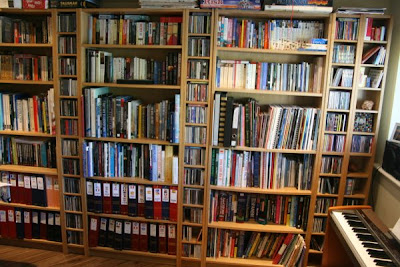 When was the last time you paid any attention to stamps? With our increasing reliance on email, I doubt if anyone still collects or studies stamps anymore. The soon-to-be-lost study of stamps, called philately, is one of the themes of Alan Bradley's wonderful debut novel, The Sweetness at the Bottom of the Pie, a tightly written and hugely enjoyable mystery.
When was the last time you paid any attention to stamps? With our increasing reliance on email, I doubt if anyone still collects or studies stamps anymore. The soon-to-be-lost study of stamps, called philately, is one of the themes of Alan Bradley's wonderful debut novel, The Sweetness at the Bottom of the Pie, a tightly written and hugely enjoyable mystery.TSBP is set in 1950s England and centers on precocious 11-year-old Flavia de Luce. Flavia appears to be the black sheep in the family. Her father is a recluse who still mourns the loss of his wife several years ago; her two older sisters, Ophelia and Daphne, make it a point to torment Flavia's existence at every chance they get. Ophelia and Daphne couldn't be blamed though, for Flavia oftentimes steal their belongings and frequently concocts mild poisons to put in their lipstick. All four of them live in an English country house who has seen better days with their cook and their father's assistant, Dogger.
One day, the de Luce's idyllic existence is thrown into chaos when Flavia discovers a murdered man in their garden. Flavia then takes it upon herself to determine all the details about the murder, one that would involve his father and unearthing dark family secrets involving stolen stamps, prestidigitation, and birds in a pie. The result is one murder mystery that is very, very satisfying.
Bradley's writing is sparse yet full of details. His characterization of Flavia, one with both the brilliance and naïveté of childhood, is flawless. With Flavia, Bradley has come up with a character that you love more and more as you progress through the novel. You'll overlook her faults, cheer her on when she's in a bind, and celebrate her triumphs and discoveries. We will all see a facet of our childhood in Flavia.
TBSB has all the elements that recall classic English mysteries -- a poisoned body, family secrets waiting to be exposed, a decaying English country house, and dysfunctional family members. In the hands of less capable novelists, these elements would translate to rip-offs of the novels of Agatha Christie, Erle Stanley Gardner, Dorothy Sayers, and P.D. James. The way Bradley weaves these elements together, however, is refreshing and uncontrived; TBSP is one of the most ingenious novels I've read this year. I think TBSP would even appeal to fans of the Nancy Drew series and even of Mark Haddon's The Curious Incident of the Dog in the Night-time.
TBSP is the first Flavia de Luce mystery and it has recently been released to a wider audience only this year. I'll surely be on the hunt for the next Flavia de Luce mystery since I think that, for lack of a better expression, Flavia rocks.
Read this book if:
- You love precocious children.
- You were always curious about why people collect stamps.
- You love death by poison.




















